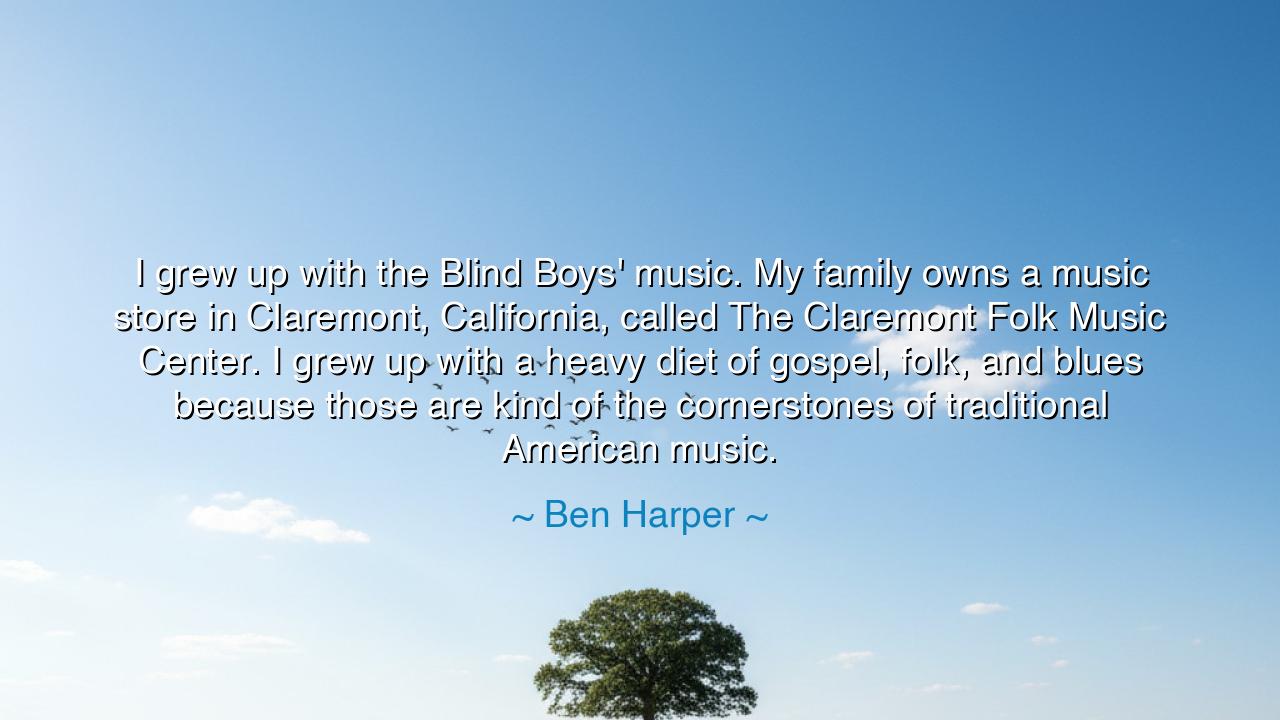
I grew up with the Blind Boys' music. My family owns a music
I grew up with the Blind Boys' music. My family owns a music store in Claremont, California, called The Claremont Folk Music Center. I grew up with a heavy diet of gospel, folk, and blues because those are kind of the cornerstones of traditional American music.






In the words of Ben Harper, there is both reverence and remembrance: “I grew up with the Blind Boys’ music. My family owns a music store in Claremont, California, called The Claremont Folk Music Center. I grew up with a heavy diet of gospel, folk, and blues because those are kind of the cornerstones of traditional American music.” To the unmindful ear, this may sound like a simple recollection of childhood; yet within it hums the ancient truth of heritage, roots, and the sacred power of music as memory. Harper does not speak merely of sound—he speaks of soul, of the echo of generations carried through strings, voices, and rhythms that refuse to die.
He was born not into wealth, but into tradition, and from that inheritance he drew his strength. The Claremont Folk Music Center was not simply a store—it was a temple of sound, a sanctuary where the spirits of the old songs lingered. There, amidst guitars and banjos, drums and harmonicas, Harper learned that music is not a product but a lineage. The gospel sang of faith and endurance; the blues carried pain transmuted into beauty; and folk—that most democratic of all arts—bound the people together, telling their stories in chords that outlived kings. These were not genres; they were roots, and from them the tree of American song grew strong.
The Blind Boys of Alabama, whose music Harper loved, were not mere performers—they were living testaments to resilience. Formed in the 1930s by young men from a school for the blind, they sang through decades of segregation and struggle. Their harmonies rose from hardship, yet they carried no bitterness—only hope, faith, and divine fire. When Harper says he “grew up with their music,” he means he grew up with their spirit, their testimony that art born from suffering can become salvation. The Blind Boys did not just sing—they reminded the world that the human voice, though frail, can shake the heavens when it sings the truth.
To understand Harper’s upbringing is to understand the soul of America itself—a land built from many hands, many voices, each adding a note to the eternal song. The folk gave voice to the working man, the blues to the broken heart, and the gospel to the spirit that would not bow. These are the three rivers that meet to form the great sea of American music. They were born from struggle—slavery, migration, loss, and longing—but they flow with grace, forgiveness, and the fierce beauty of endurance. From their confluence rose not only Harper’s sound, but the music of countless others who found freedom in melody.
And yet, Harper’s story also bears a deeper wisdom: that to know who you are, you must know where your song began. The ancients taught that every art must return to its source or it loses its soul. A tree that forgets its roots cannot stand, and an artist who forgets his heritage becomes hollow. Harper, by returning always to gospel, folk, and blues, honors the ancestors whose suffering became his inspiration. His art is not built on novelty, but on continuity—on the understanding that true creation is not invention, but communion with what came before.
So, too, must we remember this lesson in our own lives. Whatever craft or calling we follow, we must seek our roots. If we build without remembering, we create monuments that crumble. But if we build with gratitude, with awareness of those whose hands paved the way, then our work becomes timeless. Just as Harper found strength in the music of the past, we, too, can find guidance in the traditions, values, and stories that shaped us.
And thus the teaching stands, clear and eternal: honor your roots, and your voice will carry farther than you dream. Do not despise the old songs or the wisdom of those who came before you. Learn from them, sing with them, and then add your own verse to the great melody of humankind. For life, like music, is not a solo—it is a harmony woven across generations. The cornerstones of every culture are built by those who remember, and the song of the remembering heart is the one that never dies.






AAdministratorAdministrator
Welcome, honored guests. Please leave a comment, we will respond soon